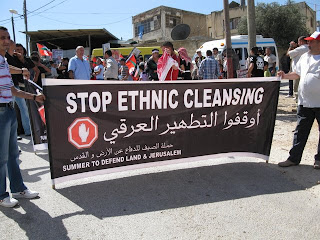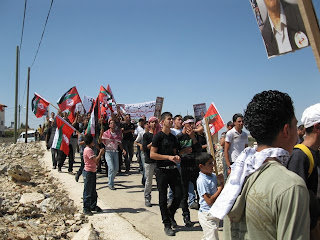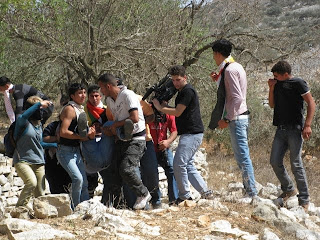Today Izbat at Tabib consists of about 300 villagers living in about 45 homes, most of which are in very poor condition. The only construction completed in recent years is a kindergarten and child care center, in defiance of Israeli regulations. Recently the road to Azzun (about 1.5 miles), which is the nearest center for medical and educational services, was blocked by an earth, rock and concrete barrier. All traffic is forced to go to Azzun on a 7-mile one-lane highway.
This past week, two MPTers went to Izbat at Tabib to spend the night and observe conditions there. They learned that the mayor's 14-year-old son had recently been taken from the family home during a night raid by the Israeli occupation forces. He was released a few days later after his father intervened with various authorities for him.
MPTers monitored the actions of the Israeli army at a "checkpoint" at the village entrance. An Israeli police jeep with four well armed military police kept an amost constant presence at the entrance during the course of the day. The military police, apparently at random, stopped cars and pedestrians, checking their IDs which resulted in long back-ups for vehicular traffic.
and vehicles going into the village.
 Drivers waited not knowing if they would be checked
Drivers waited not knowing if they would be checked
and someone taken by the Israeli military.
 Drivers waited not knowing if they would be checked
Drivers waited not knowing if they would be checked and someone taken by the Israeli military.
Well-armed Israeli soldiers in jeeps are a daily occurence in this small village.
In the morning it was learned that at least two homes were invaded by the Israeli military police during the night. Villagers related that sometime around 10:00 p.m. military police entered their homes, ordered the women, children (even sleeping babies) and the elderly to leave the house while they looked in every possible location for "young men." None were found. Villagers said that home invasions of this kind are frequent occurences.
Of great concern to the people of Izbat at Tabib is the Israeli government demolition order for 23 of the 45 homes in the villages under the pretext that they were illegally built.













































